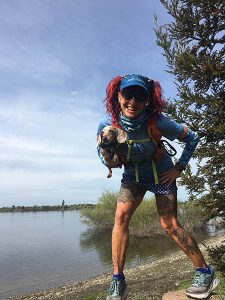Catra Corbett has run upward of 120 races of over 100 miles each. She’s one of only a handful of people in the world to have broken the hundred 100-miler barrier – and she runs all those miles mostly on fruit, nuts and plant-based protein shakes.
When she started 20 years ago, Corbett says, people simply didn’t think it was possible to run ultras as a vegan. Now, she’s part of a growing community of endurance athletes who celebrate their meatless mileage. The super-fit 51-year-old with shoulder-to-toe tattoos exudes toughness – and she’s even tougher than she looks: Corbett overcame a drug and alcohol addiction after landing in jail for selling meth. Immersing herself in clean eating gave her a new focus. “I was doing toxic stuff putting these harmful chemicals in my body,” she says. Veganism represented a fresh start – one where she took care of herself.
Sober, Corbett found herself battling new demons. “Nobody tells you you’re going to go through a huge depression. You’re going to gain some weight,” she says. Corbett didn’t set out to become an ultra runner, but then again, she doesn’t do anything halfway. A jog around her neighborhood quickly became competing in marathons. Running increasingly longer distances gave her something to work toward, helping her heal once again.
“I know I’m supposed to be here for a reason,” she says of overcoming her depression, which at one point led to a suicide attempt. “Getting to inspire other people. I try to do that on a daily basis.” And she does. Tony DeStefano, who has always been a runner, read Corbett’s story online after becoming a vegetarian himself 5 years ago. He follows her blog for inspiration in his own endurance training pursuits as a meatless runner.

Last summer, DeStefano founded Spokane Veggie Runners, a weekly running group that meets at vegan restaurant Boots Bakery & Lounge in downtown Spokane. “You don’t have to be vegetarian or vegan to join,” he says. In fact, he’d like for the group to be welcoming to everyone. “I think sometimes people are scared. They don’t even want to bring it up because they’re afraid to be judged.”
Spokane runner and Ironman finisher Selina Starno frequently wears a “No Meat Athlete” shirt at social runs, so she’s pretty much a walking billboard. “A lot of people approach me and they ask me questions about being a vegetarian,” she says. Though they’re usually positive and encouraging, many people find the prospect of trying vegetarianism for themselves daunting. “I think a lot of people are afraid of cutting out meat because it’s the biggest thing on their plate,” Starno says. So, she recommends taking it slowly, either trying it for just certain days of the week or substituting just one meat dish with a vegetarian version. “You can give up things in parts, like maybe start with fish.”
A not-so-healthy vegetarian since childhood, Starno was overweight when she began running in high school. “I finally got motivated enough to take short walks around the neighborhood – and then those walks turned into runs,” she says. “I lost 80 pounds.” Now that she runs 3 to 4 times a week, swims and bikes, Starno crafts her diet to fuel her active lifestyle. For protein, which she tracks carefully, she eats nuts, tofu, leafy greens, greek yogurt, broccoli and protein shakes.
Corbett, too, was admittedly a “crappy vegan” when she started. Now, her diet fuels a healthy and full life. She eats raw, mostly fruit and nuts, during the week and adds soy-free meat substitutes on the weekend. Gels, almond butter packets and recovery vegan protein shakes give her the extra boost she needs for long runs.
This summer, Corbett plans to run across the United States on a six-person team, four of whom are vegan and all of whom have battled mental illness or addiction and want to raise awareness. “It’s hard to get clean and sober or hard to get away from an eating disorder or get away from the mental illness you’re struggling with if you can’t talk openly about it,” Corbett says. She’s careful, though, about telling others what path they should take. Veganism and running work for her, but everyone’s different, she says. //













